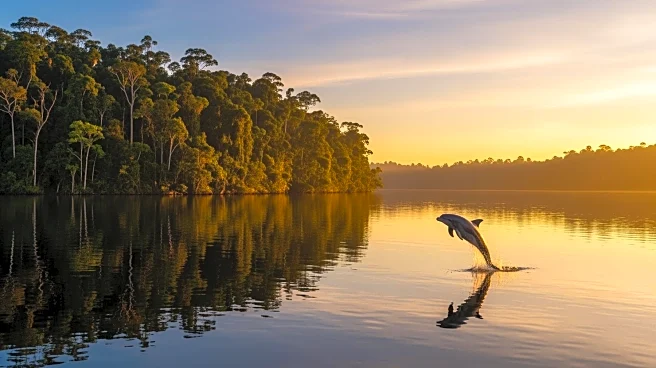What's Happening?
A recent study has uncovered the devastating impact of extreme heat and drought on Lake Tefe in Brazil's Amazonas state, where hundreds of dolphins were found dead. The research, published in the journal Science, highlights how the lake's water temperature
soared to 41 degrees Celsius (105.8 degrees Fahrenheit), surpassing typical spa bath temperatures. This environmental catastrophe is attributed to a severe drought and heat wave that began in September 2023. The study, led by hydrologist Ayan Fleischmann from the Mamiraua Institute for Sustainable Development, emphasizes the broader implications of climate change on tropical aquatic ecosystems. The findings coincide with the United Nations' COP30 climate talks in Brazil, underscoring the urgent need for action against global warming.
Why It's Important?
The study's findings are significant as they illustrate the immediate and severe consequences of climate change on biodiversity and ecosystems. The death of 153 dolphins, including endangered species like the pink dolphin and tucuxi, signals a broader ecological crisis affecting fish populations and local communities reliant on these water bodies for food and livelihood. The research points to a warming trend in Amazonian lakes, with temperatures rising at a rate higher than the global average. This situation poses a threat to the ecological balance and highlights the need for comprehensive climate policies and conservation efforts to protect vulnerable species and habitats.
What's Next?
The study's lead author, Ayan Fleischmann, plans to attend the COP30 summit to advocate for long-term monitoring of Amazonian lakes and greater involvement of local communities in developing climate solutions. The research calls for increased attention to tropical lakes, which have been less studied compared to those in temperate regions. As climate change continues to intensify, the frequency and severity of such environmental disasters are expected to rise, necessitating urgent global action to mitigate their impacts.
Beyond the Headlines
The study also sheds light on the socio-ecological crisis faced by local communities, including Indigenous peoples, who depend on these ecosystems. The extreme conditions have led to a phytoplankton bloom, further stressing the aquatic environment. This situation underscores the interconnectedness of climate change impacts, affecting not just wildlife but also human populations and their cultural and economic practices.















